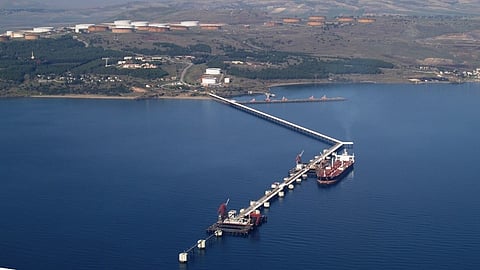

Oil prices fell on Tuesday ahead of another anticipated production increase by OPEC+ and as the resumption of oil exports from Iraq's Kurdistan region via Turkey reinforced market expectations of a supply surplus.
Brent crude futures for November delivery, expiring on Tuesday, fell 87 cents, or 1.3 per cent, to $67.10 a barrel by 13:22 EDT (17:22 GMT). The more active December contract fell 82 cents or 1.2 per cent to $66.27.
US West Texas Intermediate crude was $62.61 a barrel, down 84 cents, or 1.3 per cent. On Monday, Brent and WTI both settled more than three per cent lower, their sharpest daily declines since August 1.
The drops extend Monday's falls when both Brent and WTI settled more than three per cent lower after their sharpest daily declines since August 1.
Selling pressure intensified as OPEC+ sources hinted at another output hike, after prices declined following the resumption of Iraq's Kurdistan region's crude oil exports via Turkey, PVM analyst Tamas Varga said.
In a meeting scheduled for Sunday, the Organization of the Petroleum Exporting Countries and allies, including Russia, together known as OPEC+, will likely approve another oil production increase of at least 137,000 barrels per day, three sources familiar with the talks said.
"Although (OPEC+ is) under their quota anyway, the market still does not seem to like the fact that more oil is coming in," Marex analyst Ed Meir said.
Meanwhile, crude oil flowed on Saturday through a pipeline from the semi-autonomous Kurdistan region in northern Iraq to Turkey for the first time in two and a half years, after an interim deal broke a deadlock, Iraq's oil ministry said.
The market has remained cautious in recent weeks, balancing supply risks, mainly arising from Ukraine's drone attacks on Russian refineries, with expectations of oversupply and weak demand.
Elsewhere, US President Donald Trump won Israeli Prime Minister Netanyahu's support for a US-backed Gaza peace proposal, but the stance of Hamas was uncertain.
In an ideal scenario, shipping traffic through the Suez Canal would return to normal following a Gaza peace deal, which would remove a significant portion of the geopolitical risk premium, PVM's Varga said.
Adding to the bearish sentiment, the potential risk of a US government shutdown has raised demand concerns, said ANZ analysts in a note on Tuesday.
(Reporting by Enes Tunagur in London, Anjana Anil in Bengaluru and Emily Chow in Singapore; Editing by Muralikumar Anantharaman, Christian Schmollinger and Barbara Lewis)
